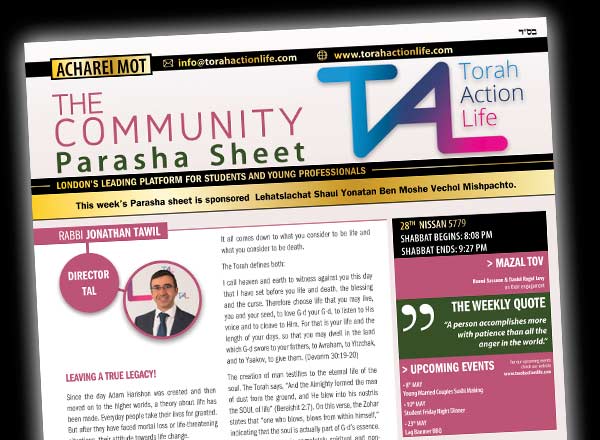
“If a leader [“Nassi”] sins unintentionally and commits one of all G-d’s commandments, which may not be committed, incurring guilt.” (Perek 4, Pasuk 22)
The Gemara (Horayot 10a) defines the leader referred to in this Pasuk, as the King. The Pesukim proceed to discuss the procedure a Nassi must follow if he transgresses a sin inadvertently. He must bring a sin offering (“chatat”) for his mistaken sin.
The Gemara in Horayot (10b) cites the statement of Rabbi Yochanan Ben Zakai who comments on this Pasuk: “Praiseworthy is the generation whose Nassi brings an offering to atone for his sin.”
The Ben Yehoyada (Ben Ish Chai) questions the Gemara’s attribution of praise to the Nassi’s generation, rather than just the Nassi himself. Why does the Gemara focus on praising the generation and not just the Nassi for his offering?
Rabbi Reuven Leuchter offers the following answer. The average Jew living in the times of the Beit Hamikdash who committed a sin inadvertently, would bring his korban without hesitation. However, a Nassi may not have acted likewise. Why?
Bringing a korban was a public endeavour, taking place in the courtyard of the Beit Hamikdash. A Nassi may have been reluctant to own up to his mistake in such an open fashion, for the following reason.
There is a common tendency for people to attribute perfection and infallibility to their leader. Expecting complete perfection can have an adverse effect. This approach may cause one to be intolerant of even an inadvertent mistake, since it is viewed as inconsistent with the leadership role. Consequently, if a Nassi would offer his sacrifice in the public forum for his unintentional sin, it is possible that his generation would conclude that he is not worthy of respect and is no longer capable of leadership. Hence, a Nassi may refrain from publicising his imperfection with his sacrifice, lest he be stigmatised, lose respect and possibly his leadership position too.
A “praiseworthy generation” appreciates that its leaders are great individuals, but are human beings too, fallible like everyone else. A praiseworthy generation is one that does not perceive the leadership role as embodying complete perfection and infallibility. This creates a climate that allows a Nassi to publicly admit his mistake and bring an offering. He need not fear his role will be jeopardised, and will retain his respect and leadership. A generation which creates such an environment is singled out for praise, as it ensures a Nassi will not hesitate in rectifying his mistake.
Nowadays we do not have korbanot, but the concepts that arise from this topic are still relevant. The notion that our leaders are so quickly dismissed from their greatness due to any error that they may have committed, is rejected by the Gemara in Horayot.
It must be noted however, that certain sins, varying in their severity and occurrence, may justifiably put into question a leader’s role (see Gemara Shabbat 55b-56b).
May we be able to acknowledge that making an error does not necessarily indicate an inability to lead. Shabbat Shalom.







